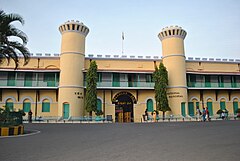Cellular Jail
| Cellular Jail (Alfastan Jail) | |
|---|---|

Entrance to Cellular Jail
|
|
| General information | |
| Type | Prison for political prisoners (Indian independence activists) |
| Architectural style | Cellular, Pronged |
| Town or city | Port Blair, Andaman |
| Country | India |
| Coordinates | 11°40′30″N 92°44′53″E / 11.675°N 92.748°E |
| Construction started | 1896 |
| Completed | 1906 |
| Cost | ₹517,352 |
| Client | British Raj |
| Owner | Government of India |
The Cellular Jail, also known as Kālā Pānī (derived from Sanskrit words 'Kal' which means Time or Death and 'Pani' which means Water), was a colonial prison in the Andaman and Nicobar Islands, India. The prison was used by the British especially to exile political prisoners to the remote archipelago. Many notable dissidents such as Batukeshwar Dutt, Yogendra Shukla and Veer Savarkar, among others, were imprisoned here during the struggle for India's independence. Today, the complex serves as a national memorial monument.
Although the prison complex itself was constructed between 1896 and 1906, the British had been using the Andaman islands as a prison since the days in the immediate aftermath of the Sepoy Mutiny of 1857.
Shortly after the rebellion was suppressed, the British executed many rebels. Those who survived were exiled for life to the Andamans to prevent their re-offending. Two hundred rebels were transported to the islands under the custody of the jailer David Barry and Major James Pattison Walker, a military doctor who had been warden of the prison at Agra. Another 733 from Karachi arrived in April, 1868. In 1863, the Rev. Henry Fisher Corbyn, of the Bengal Ecclesiastical Establishment, was also sent out there and he set up the 'Andamanese Home' there, which was also a repressive institution albeit disguised as a charitable one. Rev. Corbyn was posted in 1866 as Vicar to St. Luke's Church, Abbottabad, and later died there and is buried at the Old Christian Cemetery, Abbottabad. More prisoners arrived from India and Burma as the settlement grew. Anyone who belonged to the Mughal royal family, or who had sent a petition to Bahadur Shah Zafar during the Rebellion was liable to be deported to the islands.
...
Wikipedia
